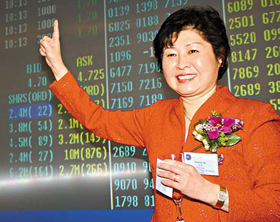BEIJING -- As night falls on the town of Mayong in south China's Guangdong
Province, container trucks emblazoned with the logo "Nine Dragons Paper", a
local household name, take to the streets.
Long after most people have gone home for the night the Nine Dragons Paper
factory is still ablaze with lights.

Zhang Yin [sina.com/file] |
"We run around
the clock. I've never seen a slack period since I worked here," says a company
manager, adding that orders had already piled up into December for the firm's
packaging products, which are used by companies like Coca Cola, Nike, Sony,
Haier and TCL.
Waste paper is the foundation of the wealth of Zhang Yin, the 49-year-old
owner of the factory and its sister plant in the eastern Jiangsu Province.
The first woman to top the Huran Report rich list in China, she has amassed
an estimated fortune of 27 billion yuan (US$3.4 billion) by recycling scrap
paper imported from the United States.
And topping the rich list has made her even richer. The share price of her
company jumped 2.77 percent on the good news, adding another 1.1 billion yuan to
her assets.
Wealthier than US television host Oprah Winfrey and author of the Harry
Potter series J.K. Rowling, Zhang is described by acquaintances as a
"round-faced, not very tall" woman who "doesn't like dressing up and looks like
a person of action".
Over the years, Zhang's low profile has helped her remain largely unknown.
"
I'm an entrepreneur. A high profile is unnecessary," Zhang was quoted as
saying by the Shanghai-based China Business News, whose reporter described her
speaking as "extremely fast".
"This title is just a calculation, not a big thing for me," Zhang Yin told a
Xinhua reporter last week. "But it's very important for my group. We have worked
for 20 years to make the fortune."
The eldest of eight children in a poor soldier's family in northeast China's
Heilongjiang Province, Zhang learnt independence at an early age by looking
after her brothers and sisters.
She started her career in waste paper trading in Hong Kong with 30,000 yuan
in 1985 and has stuck with the paper industry since then.
States by setting up the America Chung Namp, Inc. (ACN) in 1990.
The ACN, whose asset value was not calculated in the rich list, is reported
to provides nearly 80 percent of the raw materials for the Nine Dragons Paper.
"The key to the success of Nine Dragons Paper is ensuring the long-term and
steady purchase of high-quality waste paper in large quantities," said Zhang.
ACN took good care of that, ranking the largest US exporter of raw materials
for paper-making and the biggest container exporter among all US industries for
the past five years in a row.
ACN's success came with the burgeoning Chinese paper-makers' reliance on
imported scrap paper. Since its beginnings in the 1990s, China's paper-making
industry is growing faster than any other in the world with an output of 49.5
million tons in 2004, while 54.4 million tons of paper was consumed, both
figures ranking the world's second highest.
However, domestic supplies are insufficient, as only 30 percent of China's
scrap paper is recycled each year, compared with 70 percent in the United
States. Forced to buy foreign scrap, China imported 12 million tons of waste
paper in 2005, nearly half of the world's waste paper available for export.
| 1 | 2 |  |